We the Party Blu-ray Movie
HomeWe the Party Blu-ray Movie 
XLrator | 2012 | 104 min | Rated R | Jul 31, 2012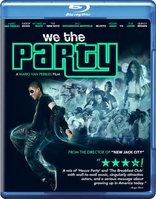
Movie rating
5.6 | / 10 |
Blu-ray rating
| Users | 0.5 | |
| Reviewer | 4.0 | |
| Overall | 3.4 |
Overview
We the Party (2012)
A contemporary urban high school tale about sex, money, music and coming of age in the US in the second decade of the 21st Century.
Starring: Mandela Van Peebles, Simone Battle, Moisés Arias, Makaylo Van Peebles, Patrick Cage (II)Director: Mario Van Peebles
| Comedy | 100% |
Specifications
Video
Video codec: MPEG-4 AVC
Video resolution: 1080p
Aspect ratio: 2.00:1
Original aspect ratio: 2.39:1
Audio
English: DTS-HD Master Audio 5.1
Subtitles
English SDH
Discs
25GB Blu-ray Disc
Single disc (1 BD)
Packaging
Slipcover in original pressing
Playback
Region A (B, C untested)
Review
Rating summary
| Movie | 3.5 | |
| Video | 4.5 | |
| Audio | 4.0 | |
| Extras | 3.0 | |
| Overall | 4.0 |
We the Party Blu-ray Movie Review
It's a Family Affair
Reviewed by Michael Reuben July 31, 2012As a feature director, Mario Van Peebles likes to flip familiar genres sideways. His 1991 New Jack City redefined the urban crime drama by making a street thug into a charismatic crime boss who was an inch away from becoming a civil rights hero (or so he claimed). Van Peebles followed that film with Posse in 1993, where he reclaimed the lost stories of African-American cowboys and added a new chapter to the cinematic history of the Old West. His 2003 film Baadasssss!, which Roger Ebert called one of the best films about filmmaking, stood the conventional Hollywood biopic on its head. The standard formula depicts an artist succeeding, then succumbing to personal demons. Van Peebles showed his father, Melvin, succumbing and succeeding at the same time—falling apart, risking his health, losing his mind and jeopardizing every personal relationship in a bet-the-farm gamble that resulted in Sweet Sweetback's Baadasssss Song (1971), which changed both the face of African-American cinema and the future of the Van Peebles family. Now that he's older and has five children, four of them teenagers, Van Peebles has tried a genre that no one would have predicted from his earlier career: the high school film. But We the Party isn't a high school film like any you've seen before, even though many of the story beats feel as familiar as a favorite old pair of shoes. Look down, and you'll find your familiar footwear spray-painted with graffiti and sporting a rhinestone buckle, because Van Peebles' original script borrows freely from diverse sources in an attempt to express the reality of teenage life as he sees it today through his own family's eyes. His film combines the sexual frankness of American Pie (but without indifference toward the consequences), the urban realism of Boyz in the Hood (updated to reflect class rifts that later economic developments created within the black community) and the yearning for stardom so deftly captured in Fame (the original), filtered through hip-hop, YouTube and reality TV. Following the Van Peebles tradition begun by father Melvin when he cast Mario as the younger version of himself in Sweet Sweetback, Mario cast all five of his children in the film, three of them in major rolls, plus their grandfather in a cameo. Several upcoming rappers play key parts, and a few established names (notably Snoop Dogg) appear in supporting rolls. As Van Peebles proudly notes in his commentary, nearly all of the high school students in the film are played by actual teens. Whatever contrivances may occur in the script (and there are more than a few), the people are authentic.

We the Party has many characters and subplots, but the "throughline" is the story of Hendrix Sutton (Mandela Van Peebles), the film's occasional narrator. Hendrix is a junior at Baldwin Hills High School in Los Angeles and an aspiring DJ, whose immediate goal is to earn enough money to afford his own set of wheels. The film opens with Hendrix's dream of an ideal beach party, and you can tell it's a dream, because it resembles an episode of MTV Cribs. The dream comes to an abrupt end when Hendrix is roused by his father (Mario Van Peebles) to get up for school. Hendrix and his older brother, Hill (Dominic "Legacy" Thomas of New Boyz), a senior, may have the oddest situation at Baldwin Hills, because their father is a teacher there, and his ex-wife, their mother, who goes by her maiden name of Reynolds (Salli Richardson-Whitfield, a Posse alum), is the school's principal. Indeed, Hendrix takes his father's class, which seems to be some sort of combination of guidance, social studies and art. It is there that Van Peebles takes the risk (one that he acknowledges, on the commentary track, concerned him) of staging a lengthy scene early in the film in which Sutton educates his class on the basics of the contemporary American economy. He shows them how they all aspire to be rich, famous or, preferably, both, but that most people can never be either. As a result, the vast majority will be seduced into buying homes that are too expensive, or cars or other consumer goods they can't really afford, in order to "feel" a bit richer or better-regarded. Then Sutton leads the class through a "greatest hits" selection of admired figures, including Gandhi, Mother Teresa and Martin Luther King, and asks what made them admirable—wealth, fame or something else? Van Peebles is enough of a moralist to put that kind of scene into a teen film, but he's also enough of a showman to make it kinetic and interesting. (The editor, George Artope, who has documentary experience, does nice work here.) The sequence resonates throughout the film and provides context and emphasis for elements of We the Party that might otherwise be just backdrop, such as the subplot involving a class project where members of the class take expensive video cameras and interview homeless people, or the sharp contrasts in wealth and social position among the students, e.g., between Hendrix and his monied friend Chowder (Patrick Cage II), whose family owns a mansion on a hilltop where he throws a party at which Hendrix acts as DJ. As a motivator of the plot, Hendrix and his four buddies, Chowder, the pimply-faced skateboarder Que (Ryan Vigil), the pint-sized Jewish loudmouth Quicktime (Moises Arias) and the techno-nerd whose debating skills have won him the nickname "Obama" (Makaylo Van Peebles), make a bet on who will be the first to lose their virginity by the end of prom. I'm sure American Pie didn't invent this device, but it might as well have, and We the Party even includes a gratuitous scene in which a character accidentally consumes a revolting bodily fluid as a homage. Having agreed to this bet through peer pressure, Hendrix finds it to be a trap, because the girl who's caught his eye is the beautiful Cheyenne Davis (Simone Battle), with whom Hendrix wants something long-term. Cheyenne has enough self-respect to be cautious with her favors and offended when she learns of the bet, as she inevitably does. To make matters worse, Cheyenne's father is a hard-nosed cop (Michael Jai White), who knows no limits to "protect and serve" when it comes to his daughter. He should probably worry less about the boys buzzing around Cheyenne and more about her best friend, Michelle (Maya Van Peebles), whose easy way with the opposite sex is probably not an example that Officer Davis would approve for his daughter. (In an obvious joke, it's Michelle that "Obama" has a crush on, and Makaylo Van Peebles notes on the commentary that he found it disconcerting to play a role that required him to be attracted to a character played by his own sister.) An entire subplot revolves around an initially silent member of Mr. Sutton's class, an aspiring rapper known as C.C. for "Conscious Criminal" (played by upcoming rapper YG). Seen initially only under the outline of a hoodie—an image created before the Florida shooting of Trayvon Martin, but now fraught with additional significance, as Van Peebles notes on the commentary—C.C. is the younger brother of a hardened thug known as Big D (Snoop Dogg), who has just been released from prison and is usually accompanied by a fellow thug called No Shame (former pro wrestler Tiny Lister). Big D wants to drag C.C. into the criminal life, but Mr. Sutton offers him an alternative: write and perform something for the school's annual talent show. The catch is that C.C.'s rap for the show has to accompany Pachelbel's famous Canon in D, which the school's orchestra is already rehearsing. "But that stuff don't have no beat", says C.C., after listening to the orchestra play. "Sure it does", says Sutton. "You gotta find it." He does. We the Party is messy and overstuffed with characters and plot, but Van Peebles is too good a storyteller to let the narrative get away from him (which often happened with his last feature, All Things Fall Apart, on which he wasn't the screenwriter and didn't have full control). Hendrix's story remains the golden thread winding through the film, right down to the conclusion, which depends on a development regarding missing money that has been carefully set up earlier. Van Peebles sticks with the teen coming-of-age genre right to the closing narration telling you what happens to various characters in later life. He just gives you a little more to think about along the way.
We the Party Blu-ray Movie, Video Quality 
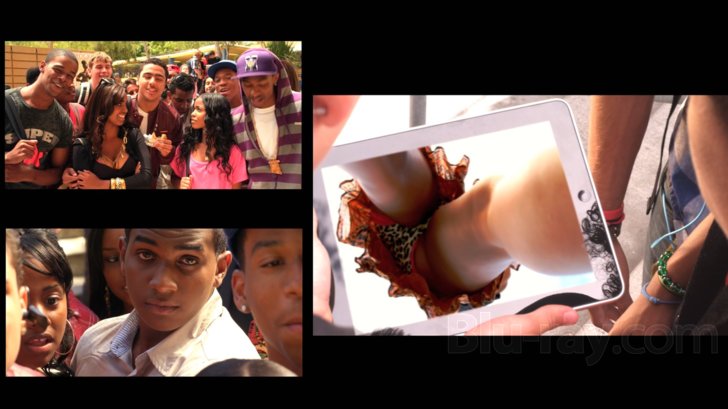
We the Party was shot on a Red One digital camera by cinematographer Anthony J. Rickert-Epstein, with whom director Van Peebles worked as an actor on Across the Line: The Exodus of Charlie Wright, which was also a Red One production. Like Across the Line, We the Party is presented on video at an aspect ratio of 2.00:1, which is not a theatrical AR but is an option for original photography on the Red One. Accordingly, the image on ARC Entertainment's 1080p, AVC-encoded Blu-ray almost certainly reveals a little more image than the theatrical AR at either the top or bottom of the frame, or both. However, the difference is small enough that none of the shots felt like there was an excess of dead space. Van Peebles and his DP presumably knew that their prospects for theatrical distribution would be limited and composed their shots for eventual distribution on DVD and Blu-ray, as well as video-on-demand. The Red One's customary virtues are on full display here, with an immaculate and detailed image capture, excellent detail and depth of field and the almost tactile sense of clarity that makes HD enthusiasts ooh and ahh with delight. In addition, Van Peebles and Rickert-Epstein have taken full advantage of the digital intermediate process to introduce a broad spectrum of intense color into the film. (Never before have I heard the word "pop" used so frequently in a director commentary.) Not every scene is wildly colorful—the classroom and the derelict district where homeless people camp out are appropriately muted, for example—but the glories of teen parties and raging hormones get their full due in We the Party's color palette, and the Blu-ray lets them shine. Filtering, ringing, artificial sharpening? This is digital origination; forget these things. Compression artifacts? I didn't see any.
We the Party Blu-ray Movie, Audio Quality 
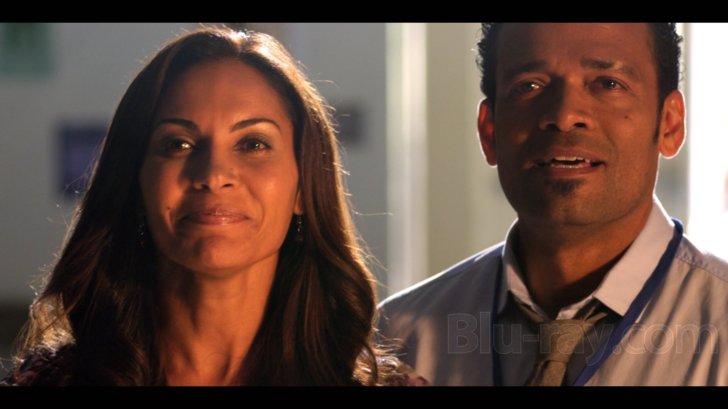
The word "subtle" may seem an odd one in the context of a soundtrack heavily dominated by a hip-hop beat and rap lyrics, but the DTS-HD MA 5.1 track for We the Party is surprising in its restraint. Yes, the music takes full advantage of the lossless format's dynamic range. If you have a sub and want to turn up the volume, you can certainly rattle any nearby loose objects. But the music mixers have done a fine job balancing disparate elements like the deep bass and the string section in the rap adaptation (written by Van Peebles and sung by YG) of Pachelbel's Canon in D. At the party thrown by Chowder, the constant balancing between music and dialogue as the action moves to different parts of the house is an interesting exercise in juggling story vs. atmosphere. And there are subtle elements to the track that register at an almost subliminal level (one of them accompanies the appearance of the money that figures in the climactic plot development). For incidental music and underscoring, Van Peebles has once again turned to Tree Adams (Californication), as he did on All Things Fall Apart. Adams is a versatile composer, whose work blends in neatly with the shifting moods of the film. The dialogue is always clear, unless one's ear for contemporary urban slang is out of tune, in which case there are subtitles.
We the Party Blu-ray Movie, Special Features and Extras 
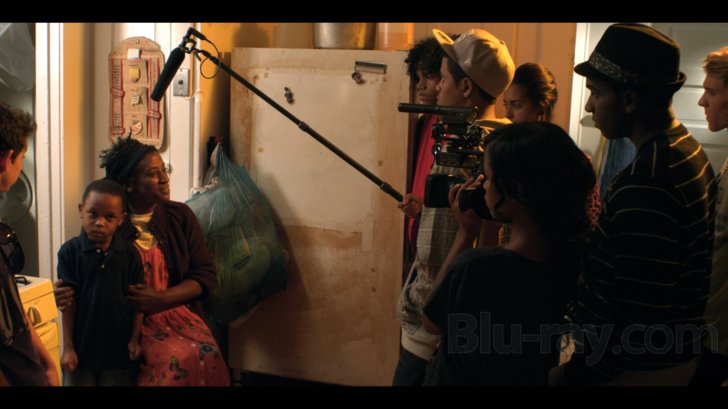
- Commentary with Writer-Director Mario Van Peebles and Actors Mandela Van Peebles and Makaylo Van Peebles: An additional participant not listed is actor Morgana Van Peebles, who plays Megan, one of the principal dancers in the school talent show. She tends to defer to her older brothers and her father, who dominates the track. Van Peebles regularly prompts his kids with questions, e.g., about their memories of filming specific scenes, but it's clear that none of them is yet sufficiently confident to want to share the microphone with their more accomplished father. Van Peebles is deliberate in his technical choices and points out numerous elements of color, editing rhythm and sound design. He also describes audience reaction to various scenes and reports on the internal debate that he and his producing partners conducted over whether to try for a movie that could be rated PG-13. Ultimately, they opted for an R-rated film, so that the language would sound authentic. (The rating is strictly based on language; as Van Peebles notes, there's no actual sex in the film.) Van Peebles is also proud of the fact that almost all of the teens in the film were played by real teens.
- Music Videos: All four of the videos are formatted as HD at 1080p. However, the source materials appear to be standard definition.
- "Truth" (3:50): YG
- "She's a Vegan (3:01): MVP
- "Light at the End of the Tunnel" (3:27): MVP
- "Forever" (4:02): MVP and Katarina
- Theatrical Trailer (HD, 1080p; 2.00:1; 2:13): It conveys the sound and a general sense of atmosphere, but only scratches the surface of what's in the film.
We the Party Blu-ray Movie, Overall Score and Recommendation 
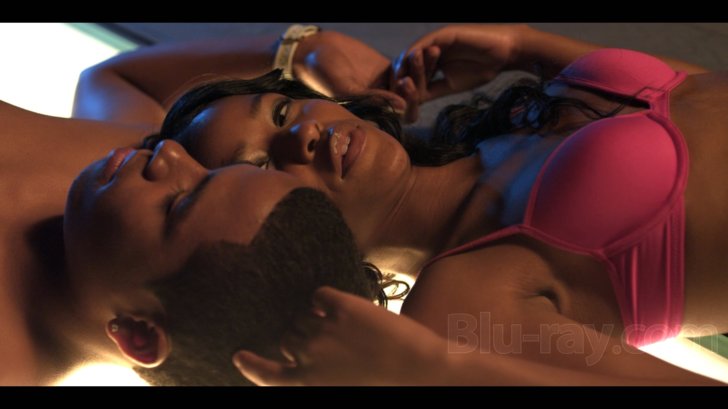
When We the Party was briefly in theaters in April 2012, some reviewers found it contrived. (Roger Ebert, who "got" Van Peebles from day one, was complimentary.) My response to such criticisms is usually along the lines of: "And . . . ?" Movie plots are by their very nature contrivances, and teen films are especially notable in that regard. Have you ever sat down and thought through, really thought through, the plot of a John Hughes film? They don't make much sense. Nobody holds detention sessions like the one in The Breakfast Club, and even a trained shrink with detailed case histories would be hard-pressed to assemble the perfect array of neatly defined types that just happens to gather there one Saturday morning, let alone meld them into the coherent unit they become in one day (one day!). Storytellers invent this stuff for entertainment and maybe to make a point or two. If they stick to the rules they set for themselves—Hughes did, and so does Van Peebles—they're fully entitled to their nips and tucks on reality. Highly recommended.
Similar titles
Similar titles you might also like

Fist Fight
2017

Take Me Home Tonight
2011

Poms
2019

Night School 4K
2018

Sisters
2015

High School High
1996

Romy and Michele's High School Reunion
15th Anniversary Edition
1997

Dance Flick
2009

Mr. Woodcock
2007

Middle School: The Worst Years of My Life
2016

Accepted
2006

The D Train
2015

The DUFF
2015

A Million Ways to Die in the West
2014

Afternoon Delight
2013

Here Comes the Boom
2012

Rock of Ages
2012

Sister Act 2: Back in the Habit
1993

American Reunion
Unrated + Theatrical
2012

Hamlet 2
2008
